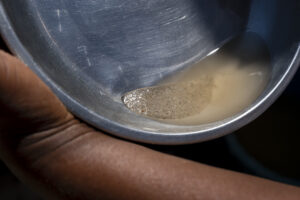- African Energy 2024: Surging investment, waves of change
- AIM Congress 2025: Competition opens doors for Africa’s top tech innovators
- Zimbabwe rolls out $24M project to reduce use of mercury in gold mines
- Zambia secures $184M IMF support as economic growth set to decline to 1.2 per cent
- Equity enters alliance with ODDO BHF to spur Europe-Africa investments
- Air Tanzania hits turbulence: Can the airline fly back to EU skies?
- Ghana’s President Elect John Mahama Outlines His Economic Blueprint
- AfDB backs “green shares” funding model with $30M AFC equity boost
Browsing: Tanzania
Tanzania is looking to be the regional leader in production of sunflowers and with it to become the lead producer of edible oils.
To meet this target, Dodoma, the nation’s administrative capital has been selected to grow both sunflower and groundnuts too.
A 4.4bn/- investment is slated to kick start the project while at least one refinery plants valued at 1.5bn/- is expected to produce at least 30 tonnes. While the regional production capacity has not been made public, Dodoma and its vicinities already boasts of over 10 small and medium sized plants.
Experts say the region has the perfect climate for sunflower and groundnuts production. The semiarid climate has in the past worked for the production of groundnuts in large amounts and was the leader in export of the legumes.
Now years later, the region maybe revived to its glorious days. However to achieve this, public private partnership is …
Trade between Tanzania and China has been adversely affected by the ongoing global coronavirus pandemic.
The turn for the worst between Sino-Tanzanian trade is only to be expected as movement of both goods and people is restricted the world over.
In a press release that was issued recently by the respective authorities, Tanzania’s Minister of Industries and Trade, Mr Innocent Bashungwa, told local press that trade volumes to and from the two countries has taken a significant blow.
Cargo flow between the two countries is now limited if not completely stopped and the picture is grim across the region. While it is estimated to cost both parties huge sums of money, neither the Tanzanian authorities nor the counterparts from the Chinese embassy have released any specific figures.
The closed borders owing to the coronavirus outbreak, is the direct cause of the dropped trade between the two nations. Until the outbreak, …
China’s influence in Africa has reached historical proportions and the US, coming rather late into the game, is now attempting to ‘change Chinese narrative’ on the continent.
The US is looking to move Africa from training or rather petting the dragon to slaying it, metaphorically speaking.
The new US-Africa policy that was launched in 2018, is designed for this purpose. As a top US diplomat put it, the policy “…will continue to counter China’s influence in Africa in order to slay the dragon.”
The US would have Africa and the World at large know, the continent is now getting “the attention it deserves from senior US officials.”
With the new policy, that is meant to guide bilateral relations with Africa, the US is trying to improve its public diplomacy outreach.
As China continues to assert itself on the continent with ever more development pacts, the US is now trying to …
Tanzania is in the processes of constructing mega court buildings that are large enough to house all levels of judicial services from the Primary Court all the way to the Court of Appeal. The actual value of the project has not been made public but due to the size and scope, it is estimated to cost onward of multi-million dollars.
The initiative is undertaken by the Judiciary of Tanzania and the resulting six High Court buildings are christened the Integrated Justice Centres (IJC) of Tanzania. The project is already underway across five regions of the country.
The court buildings will be in all major cities including the country’s administrative capital of Dodoma, the tourist hub of Arusha, the lake city of Mwanza and the fast developing agricultural town of Morogoro where ongoing work on the Standard Gauge Railway (SGR) have seen tremendous growth urban to rural migration in search of …
Based in Ethiopia’s capital of Addis Ababa, Coop Bank is growing by leaps and bounds, with profits up 29 percent in the 2018/19 financial year closing the year with USD 20.4 million under lock and key.
More than profit, the Bank also enjoyed huge growth if it’s total assets which shot up by 40 percent, a sector high for Ethiopia’s banking industry. Likewise, its loans and advances also went up an impressive 56 percent representing more than double its performance in the previous year.
The bank has credited the asset growth to deposit mobilisation which pushed up loans and advances. The bank had yet an impressive growth this time in deposits which increased 40 percent.
Coop Bank mustered its investment in NBE bonds which it increased to more than double (53%) of what it had in the previous financial year. Further still, this immense investment represents 20 percent of its …
In the backdrop of Tanzania’s Central Bank announcing a stimulus package for commercial banks, loans advanced by banks have shot up significantly over the last year and the stimulus package is expected to sustain if not increase lending.
The Central Bank, the Bank of Tanzania (BoT) has this week released its Consolidated Zonal Economic Performance Report which shows lending by commercial banks have increased considerably in the last year.
The report shows that the highest amount of growth in bank loans was parallel to ongoing national infrastructure development works. The highest increase in loans was to companies operating in the central and south eastern zones owing to increased construction projects and to trading activities, respectively.
This would explain reduced lending in the commercial capital of Dar es Salaam. Lending in the bustling port city actually fell 1.6 percent compared to the same period last year. However, despite the percentage decrease, …
Tanzania’s Controller and Auditor General (CAG) has unveiled the country’s Local Government Authorities (LGA) have been involved in the embezzlement of millions of dollars issued to fund nonexistent projects.
Reporting to the country’s President John Magufuli, the CAG’s report indicated that LGA’s across the country have been corruptly siphoning tax payers money for individual gain. The 2018/19 report shows what can only be described as gross mismanagement of public funds.
In the report, Tanzania’s CAG Mr Charles Kichere also reported the gross misuse of funds in excess of USD 342.2 million by the country’s Local Government Authorities (LGA).
Worse still, while the LGAs collected more than USD 46.5 million in the said financial year, only 26.37bn/ was allocated to the rightfully designated development projects while the remaining 17.41bn/- was, according to the CAG report, misused.
Further still, another 10.39bn/- in local revenue that was collected by some 84 Local Government …
Barely a week after Tanzania’s President John Magufuli ordered engineers to be sacked should a bridge (or any infrastructure) under their jurisdiction fails, the heavy toll of rains on infrastructure in the country has been estimated at 40bn/-
Its only the beginning of the first heavy rains season but infrastructures across the country are taken a heavy beating and succumbed. The damage caused is not only destroying bridges, rails and roads, it is also destroying careers as well.
The country’s President Dr. John Magufuli ordered sacking of any engineer where bridges and other infrastructures collapse, should they fail to respond accordingly. The president gave the order when visiting a damaged bridge that had rendered transportation null for over a fortnight on the outskirts of Dar es Salaam.
Responding to the ongoing rains and the resulting damage to infrastructure, Mr. Isack Kamwelwe, the country’s Minister for Works, Transport and Communication, told …
In a bid to keep the sector going, the Tanzanian government has announced plans to significantly lower hunting permit fees.
The relief comes shrouded by coronavirus threat which is the push behind the announced review of annual hunting blocks license fees.
Local media quoted the Deputy Minister for Natural Resources and Tourism, Mr Constantine Kanyasu, announcing the fee slash plans. According to the high government official, the planned fee cut is in response to requests by hunting companies who are complaining of reduced bookings owing to the global coronavirus threat.
“The Ministry of Natural Resources and Tourism will meet hunters again before the end of this month to inform them on the government’s action to rescue the subsector,” the Deputy Minister told media.
On behalf of the hunting companies, the Tanzania Hunting Operators Association (Tahoa) pointed out that there is still room to review the fees ahead of the hunting …
Food security has always been a matter of much concern across Africa, the threat has only been extenuated by the worsening coronavirus outbreak.
With the rest of the World tied up with response to the coronavirus in their own countries, scientists in Africa have to step up to the food security threat on the continent.
Up to the task are Tanzanian scientists who early this week, in the nick of time, announced a breakthrough in maize research that may very well answer the impending food security threat.
The Tanzania Agricultural Research Institute, announced its scientists have developed two genetically modified maize varieties that to a great extent, stand to solve the food security issue in the country and region at large.
First is a maize variety that is much higher in protein concentration than the regular maize types now been grown across the country. This variety will serve to give …












